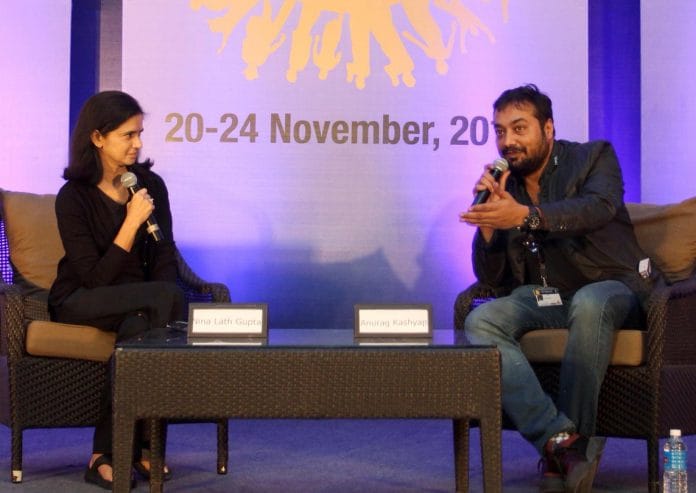CBI launches preliminary enquiry after I&B ministry allegations of financial embezzlement at NFDC, including ‘undue’ payments to Kashyap, Banerjee.
New Delhi: The CBI has initiated a preliminary enquiry into allegations of financial embezzlement, irregularities and violation of prescribed norms at the National Film Development Corporation (NFDC), which includes charges that the corporation made excess and undue payments to film directors such as Anurag Kashyap and Dibakar Banerjee.
The CBI move comes months after the Modi government sought a probe into the allegations.
Kashyap denied any wrongdoing. Banerjee did not respond to queries from ThePrint.
The CBI’s anti-corruption branch — in a letter dated 23 October 2018, and addressed to the director (finance), NFDC — has said that a preliminary enquiry has been launched against unknown officials of the corporation, Sun TV, UFO Movies, Anurag Kashyap Films and other unknown people.
The CBI has asked NFDC to furnish certain documents to help the probe.
The NFDC, constituted under the Information & Broadcasting (I&B) ministry in 1975, receives central funds and other grants to participate in film festivals and make publicity films for the government.
It has been embroiled in a controversy after its managing director, Nina Lath Gupta, was sacked for allegedly favouring Sun TV networks in February 2018, when Smriti Irani was the I&B minister.
While Gupta re-joined the NFDC following a Delhi High Court order, the I&B ministry removed her again in May — even though it dropped the charges against her — when Irani was replaced as minister by Rajyavardhan Singh Rathore.
Appointed by the UPA government, Gupta was the NFDC chief between 2006 and 2018. Her name, however, does not figure in the CBI letter.
Also read: NFDC may not be shut after all as I&B ministry comes up with a fresh merger plan
Excess payments, favouring some companies — the allegations
The I&B ministry had sought a CBI probe against NFDC during Irani’s tenure, on the basis of a report prepared by a team of its officials.
The team’s findings have been quoted in the CBI letter.
“There are several observations in the aforesaid report shown therein that violation related to release of advertisements as well as payments,” reads the CBI letter. “Major observation was NFDC has released publicity/advertisement spots to channels which were not empanelled with DAVP (Directorate of Audio-Visual Publicity).”
The letter also claims that “it has been observed” that the NFDC released advertisements to individual channels in excess of the prescribed ceiling of 5 per cent of the agreed budget for media campaigns.
“Bill payments were made without telecast certificates from third-party monitoring agency as prescribed in EMA (Electronic Media Advertisement) Policy resulting in over-payment of 38,41,800 to M/s Sun TV Network Pvt Ltd,” the CBI letter says.
It is alleged that NFDC favoured UFO Movies over another company for the release of publicity slots between 8 October 2011 and 21 December 2011. NFDC also allegedly made an excess payment of Rs 40,13,898 to UFO movies.
UFO Movies has denied the allegations.
“Any media plan is finalised and approved by the concerned ministry and the agency. The media platforms do not have any role in this process,” the company said in an email. “We run all campaigns based on release orders received from the client or their agencies. The invoices are submitted along with logs after the activity. The payment is made accordingly.”
‘Film directors paid unduly large sums of money’
It is also alleged that NFDC paid over Rs 62 lakh to director and producer Kashyap for That Girl in Yellow Boots, violating its own norms, which stipulate that the corporation can only fund a movie as a co-producer.
The money was not deposited in a joint account but paid directly to him after the production was completed, the CBI letter adds.
It is also alleged that it was not the only time that money was “unduly” paid to Kashyap. According to the CBI, the NDFC paid Kashyap Rs 1.5 crore, directly in his account, for the film Dabba, more popularly known as The Lunchbox.
Similar allegations of money being transferred directly to director Dibakar Banerjee’s account by NFDC have also been made.
“In all the above cases the profits earned by the producers were not shared by NFDC but pocketed by the producers,” it is alleged.
The CBI has also asked NFDC for Kashyap and Banerjee’s income tax returns and audit reports as well.
Vehement denial by Kashyap
Kashyap, however, strongly denied the allegations. Both the films were NFDC co-productions, and the NFDC recouped its investment in full in both cases, he said.
Anurag Kashyap Films received Rs 1.5 crore by NFDC for the production of The Lunchbox, and the amount was fully recovered by NFDC as of April 2018, Kashyap said. As for That Girl in the Yellow Boots, Rs 62.4 lakh was given by NFDC on 26 June 2010, and the entire amount was returned by August 2011.
“It’s co-production and many government bodies and investors invested in The Lunchbox…And many other investors in Yellow Boots,” Kashyap told ThePrint in a series of text messages. “There is an agreement (signed and agreed by all parties) to state the nature of the transfer. It’s in the company account and not in any person’s personal account.”
Film producer Guneet Monga, who co-produced both these films with Kashyap under the production house, Anurag Kashyap Films, echoed his denial.
“These allegations are completely false,” Monga told ThePrint. “All the payments were made as per an agreement signed with NFDC, and all the money has been returned to NFDC.”
“In fact, in The Lunchbox, the NFDC actually made a profit.”
She also said that the allegations that the money went to Kashyap’s personal account are “baseless and false”.
Kashyap and Monga stopped working together around 2014, and the production house has been lying dormant since.
Banerjee did not respond to queries sent by ThePrint. This report will be updated when he does.






